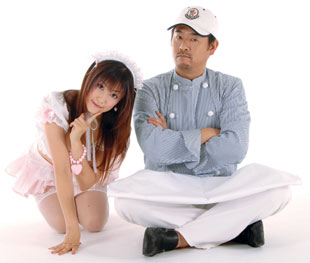
January 7, 2010
Ota Meshi Cooking
A cookbook author tries to get otaku into the kitchen
By Metropolis
Originally published on metropolis.co.jp on January 2010

Courtesy of Yunmao Ayakawa
Otaku are infamous for a lot of things, but being gourmands isn’t one of them. Immersed in their hobbies, they often forget to eat, or opt for unhealthy fast food and snacks with lots of calories to fuel their maniac lifestyles. But a recent cookbook intended exclusively for fanboys seeks to change that.
“This is a cookbook for otaku, written by an otaku of otaku,” says Yunmao Ayakawa, author of Ota Meshi Cooking. “In short, this is a cookbook of ideas that I, as an otaku, want to present to my fellow otaku.”
Since Daisuke Terasawa’s Mister Ajikko, the tales of a young culinary wiz, was first published in 1986, there has been a string of popular food-themed manga and anime, including Cooking Papa, Oishinbo and Yakitate Japan. There is even a dedicated category for “gourmet manga and anime,” about young men and women struggling to become great chefs. Last year, NHK introduced a culinary show that’s become a hit with otaku, Cooking Idol Ai! Mai! Main!, which features animated segments and is hosted by an 11-year-old girl. However, otaku still seem more interested in buying drawings of food than ingredients to make a meal.
Ayakawa (pictured, with chef Junichiro Nishi), a professional cosplayer and idol, knows this from experience. She recalls that as a student she used to get caught up in otaku hobbies and spend four days without food or sleep, which “caused my bust to drop from a D-cup to a B.” After speaking with her otaku friends, she found this destructive cycle of obsession was par for the course.
“To a fault, otaku put their time, energy and soul into what they love,” she says. “But I thought that in order to have a good fantasy we first need to have good food.”
All of which makes perfect sense, but after they’ve spent all their money on anime, manga, videogames and merchandise, otaku may find that they have nothing left for food. To overcome this challenge, Ayakawa decided to introduce extremely simple recipes that can be made quickly using cheap ingredients available at convenience stores, where many otaku head late at night to read manga or pick up pre-made bento dinners.
The book employs all kinds of tricks to get otaku interested in whipping up a meal. Ayakawa introduces recipes used by famous directors, illustrators and mangaka in their homes; there is plenty of ani-meshi, or food that appears in anime, and bento becomes chara-ben, or boxed lunches featuring popular characters.
Chara-ben are already popular with prepubescent Japanese boys, and the ornate lunchboxes that mothers make for their offspring have warranted a rash of photo books over the past decade. However, Ota Meshi Cooking is unique in that Ayakawa made most of the examples herself, and chose images of beautiful girls that would appeal to her target audience.
But perhaps the best part of the book is the inclusion of details that would only appeal to otaku. For instance, there is an interview with “Dr. Chiba,” director of the first aid station at Comiket, who explains that otaku need to maintain their health so they will have the energy to go all-out combing the stacks at the massive comic market.
Ayakawa is confident that once otaku read her book, their characteristic fastidiousness will kick in and a generation of “cooking otaku” will be born. Indeed, it has already begun: Hirono Arai of the idol group Nakano Fujoshi Sisters is renowned for her exploits in the kitchen.
“Cooking takes a lot of concentration and imagination,” says Arai, 22. “It is really easy to get deeply into it.”
Ota Meshi Cooking (Prest, 2007, 78pp, ¥1,500) is available at area bookstores.





